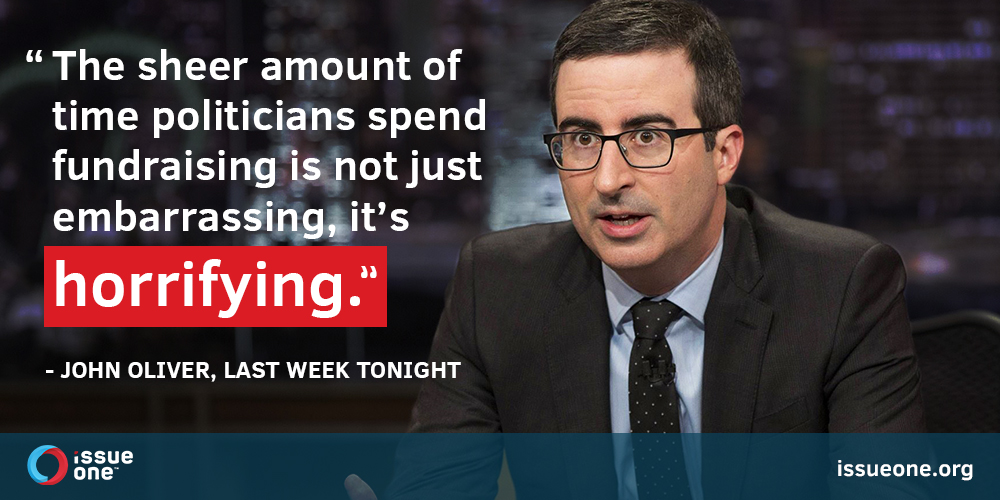Archived
Reform in the States: A Roundup
This is part of a series examining ethics, transparency and campaign finance proposals in the states. Washington, D.C. is the only place in the country where money-in-politics reform is a tough sell.…
Archived
Let’s stop giving members of Congress a pass.
Here’s what I mean: While the media, and even the presidential candidates themselves, rail against super PACs, our democracy is being hollowed out by a problem that existed long before Citizens United—“hard money” fundraising by Congress. Last night, on Last Week Tonight, show host John Oliver absolutely eviscerated Congress for members’ endless hard money fundraising—a member of Congress actually referred to it as torture.
Watch the whole clip below (it’s long, but it’s absolutely worth it).
“Hard money” refers to contributions given directly to a candidate’s campaign, rather than outside political groups such as super PACs or dark money nonprofits. While direct campaign contributions are capped at $2,700 per election, these donations still comprised bulk of political giving in the 2014 midterms.
Our members of Congress—our employees, remember—spend nearly half their time chasing hard money, sitting on the phone in cramped cubicles talking to the wealthiest among us. They could be chatting with constituents at the local diner, but instead they talk almost exclusively to the rich, and come to believe that the concerns of the rich are the only concerns people have. As John Oliver put it, “If you are desperately trying to rack up dollars, that can affect the kind of people you’re talking to on the phone… and that is a huge problem because it cannot help but affect the way you see the world—if you’re only calling rich donors whose main concerns are estate taxes or which Belgian kimono their cat will wear that day.”
Therein lies the problem. Even if we abolished super PACs tomorrow we would do nothing to incentivize our elected leaders to talk to anyone other than the very wealthy. They’ll still need donors who can “max out,” and that probably doesn’t include me, or you or anyone you know.
So what do we do about this? John Oliver has that covered too. Three of the most effective solutions to money-in-politics are sitting in Congress, ready to be passed, right now. The Government by the People Act, the DISCLOSE Act and the Stop Act are three of the more ambitious pieces of legislation designed to supercharge the power of small donors, ensure transparency for our elections and get our lawmakers back to work. None of these bills would require overturning Citizens United, meaning we can fix much of what ails our democracy with just a few acts of Congress right now.
The Government by the People Act, introduced by Rep. John Sarbanes (D-MD), is particularly promising because it’s based off a system that’s already seeing great success in New York City. In New York City elections small donations (contributions of less than $100) to candidates are matched 6 to 1 by the city. Turning a $25 contribution into a $150 contribution provides a powerful incentive for candidates to get back in their districts talking to their constituents. A 2012 study by the Brennan Center for Justice showed that 90 percent of census blocks in New York City had at least one small donor to a city council race, as compared to only 30 percent for state assembly races (those candidates are not eligible for matching funds). One study concluded, “by pumping up the value of small contributions, the New York City system gives [politicians] an incentive to reach out to their own constituents rather than focusing all their attention on wealthy out-of-district donors, leading them to attract more diverse donors into the political process.”
A system like this can absolutely work for federal elections—there’s no reason we have to accept our members of Congress holding literally thousands of fundraising events a year (a sobering fact prompting Oliver to quip, “Washington is like Rod Stewart’s haircut: Party in the front, party in the back, frankly, too much party, and no business anywhere to be found.”)
We can and must do something about it. You can start by heading over to Congress.gov and seeing if your members of Congress support any of these pieces of legislation. If they do, be sure to reach out and thank them. If they don’t, ask them to co-sponsor the bills mentioned above. We could fix our democracy tomorrow with a few acts of Congress, and we must pressure them to act. For our part, Issue One’s ReFormers Caucus is kicking off a new campaign urging Congress to stop evading the issue and declare money in politics a crisis.
Oliver is right, congressional fundraising has gone off the rails, and the victims, of course, are the American people.That said, there’s never been a more exciting moment to be fighting for money-in-politics reform. The public is more aware and ready to act than it’s ever been, and it’s only a matter of time before that power is brought to bear on Congress.
Issue: Dark Money & Super PACs
Archived
This is part of a series examining ethics, transparency and campaign finance proposals in the states. Washington, D.C. is the only place in the country where money-in-politics reform is a tough sell.…
Archived
It’s no secret that campaigns are big money-makers. The 2012 election, the most expensive in history, cost over $7 billion — that’s a lot of buttons and yard signs. Through…
Archived
According to a recent New York Times/CBS News poll, Americans across the political spectrum are concerned about the influence of money in politics. 85% of respondents, including 81% of Republicans,…
 (john-oliver-last-week-tonight)
(john-oliver-last-week-tonight)
